People stand around shoes and stuffed animals that honour Indigenous children during the first National Day for Truth and Reconciliation on Parliament Hill in Ottawa on September 30, 2021. (Photo by Lars Hagberg/AFP via Getty Images).
Each year, September 30th marks the National Day of Truth and Reconciliation in Canada.
It is a day to honour the lives of the 150,000 First Nations, Inuit and Métis children who were forcibly removed from their families and communities and transferred to residential schools sometimes thousands of kilometres away from their homes. They endured horrific conditions of physical and sexual abuse, unsanitary conditions resulting in disease, malnutrition and starvation, and forced labour. They were indoctrinated out of their identity, languages and cultures.
Thousands of children never made it home. These children should never have been taken from their families.
Indigenous Peoples across Canada still endure the weight of a past that has not passed, a past that still seeps into government policy and continues to be felt through generations. Our collective responsibility is to ensure the lives of Indigenous children broken by residential schools are never forgotten.
Ketty Nivyabandi, Secretary General, Amnesty International Canada
Residential schools were part of a colonial policy to eradicate Indigenous cultures, languages, and communities. The last school did not close until 1996. Intergenerational trauma, ongoing harms, and discriminatory practices continue.
On this day, all non-Indigenous people are called upon to witness and act upon this truth, without which there can be no reconciliation.
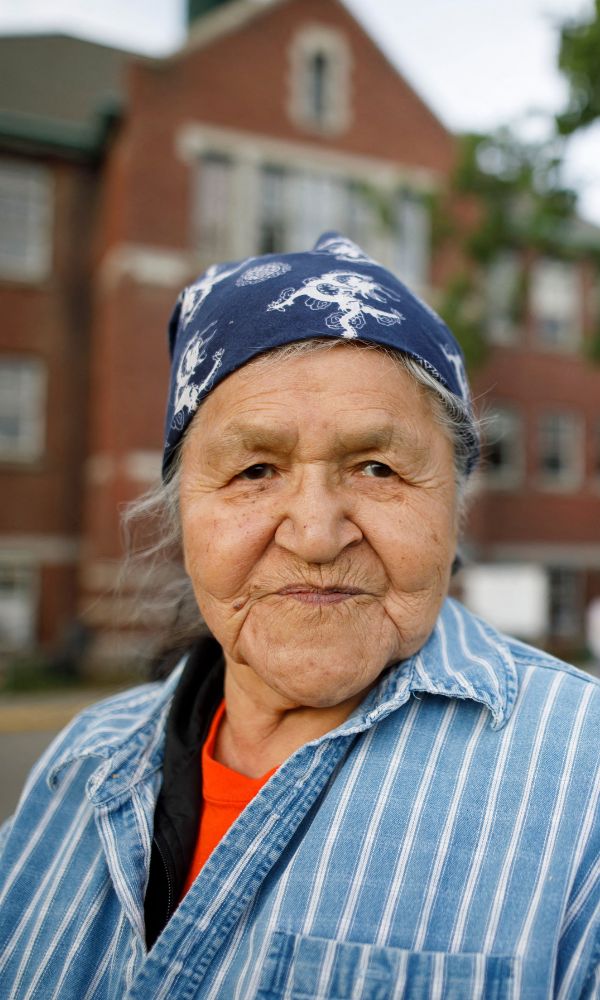
Evelyn Camille, 82
Residential School survivor Evelyn Camille, 82, poses next to a makeshift memorial at the former Kamloops Indian Residential School on June 4, 2021. 215 children’s remains were discovered buried near the facility in Kamloops, British Columbia. (Photo by Cole Burston/AFP via Getty Images)
Brian Lee, 68
Brian Lee, the 68-year-old survivor of the Ermineskin Indian Residential School walks around the site where the school stood in Maskwacis, Alberta, on June 7, 2022. (Photo by Cole Burston/AFP via Getty Images)
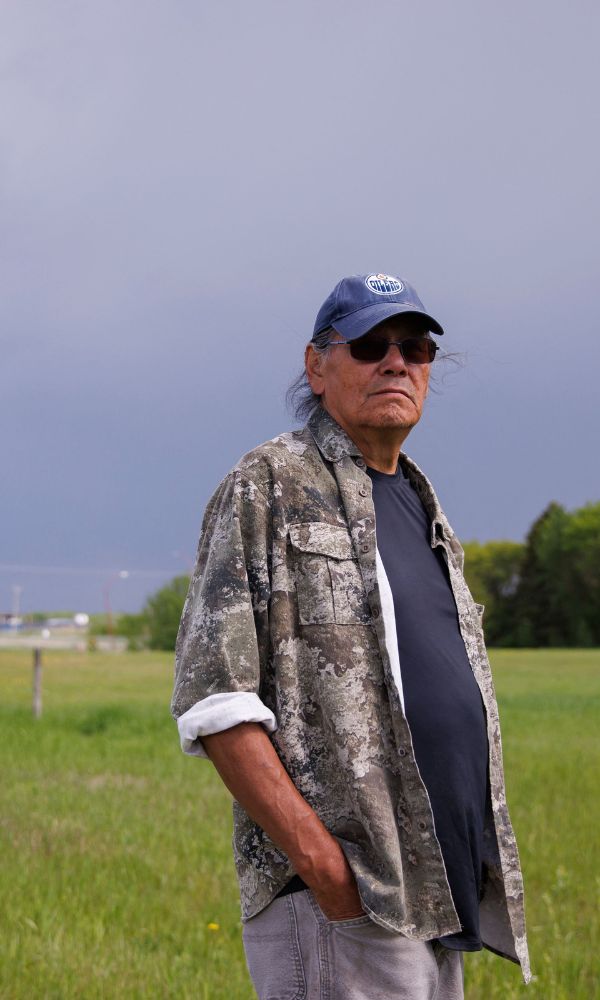
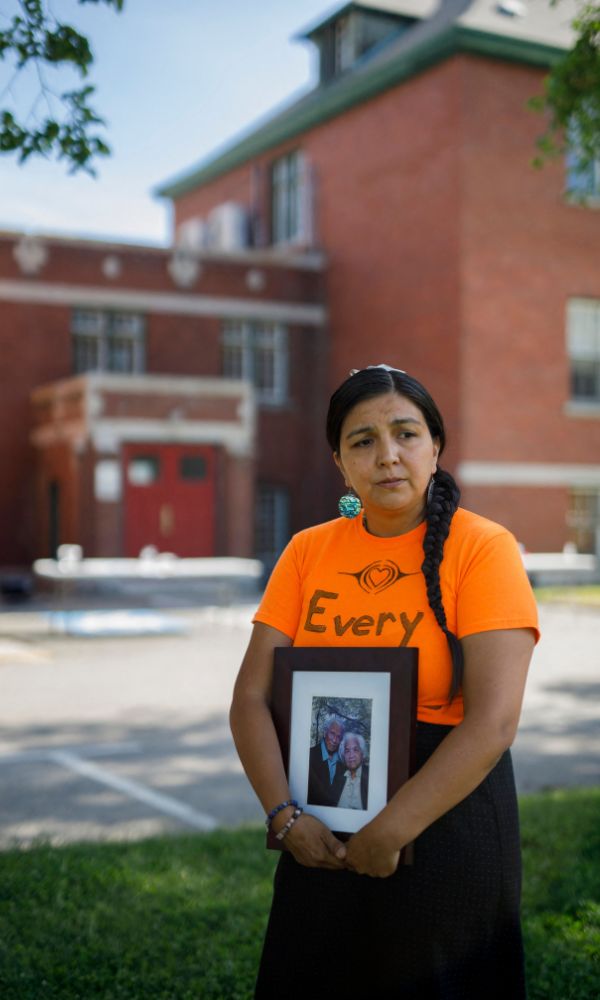
Stephanie Gutierrez
Stephanie Gutierrez holds a photo of her grandmother Tillie Gutierrez, a survivor of the Kamloops Indian Residential School, and grandfather Allan Gutierrez, in front of the school on June 2, 2021. (Photo by Cole Burston / AFP via Getty Images)
Chief Wilton Littlechild, Ph.D.
Chief Wilton Littlechild, Ph.D., is a Cree chief, residential school survivor, and lawyer who has worked both nationally and internationally including with the United Nations to advance Indigenous rights and Treaties. (Photo by Giles Clarke/Getty Images)
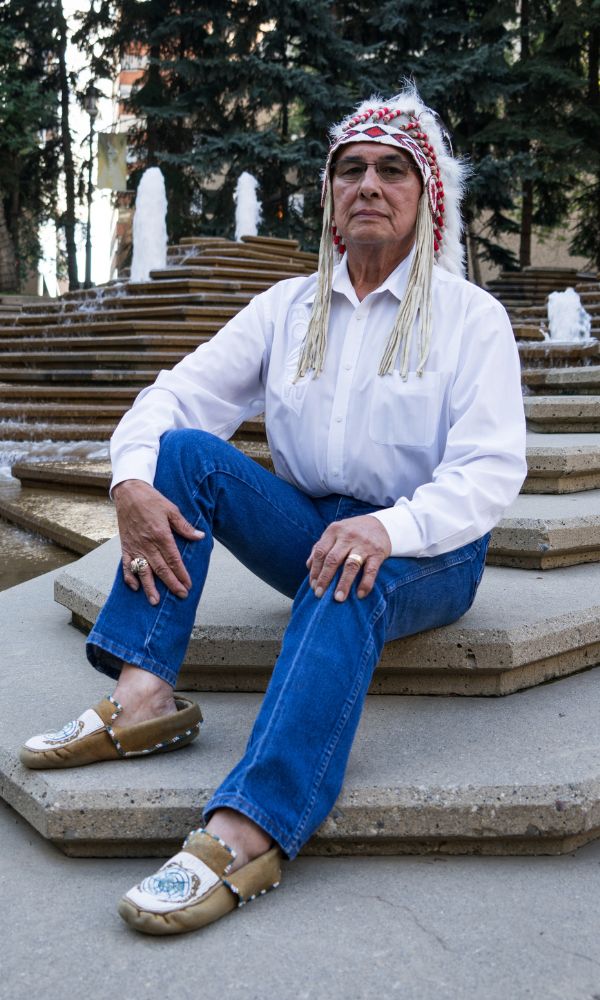
HOW TO TAKE ACTION
Listen to First Nations, Métis, and Inuit communities and peoples and support their calls for justice and accountability. Do not ask Indigenous Peoples to support your learning or to share ways for you to take action if they have not offered. Indigenous Peoples and communities are grieving and have been sharing resources and knowledge for many years.
Here are some ways that you can reflect and take action on Truth and Reconciliation Day and every day.
PERSONAL ACTS OF RECONCILIATION
We highly recommend taking a virtual tour of the Mohawk Institute Indian Residential School, courtesy of the Woodland Cultural Centre. It is a powerful walk-through and retelling of the longest-running residential school in Canada’s history.
The Woodland Cultural Centre has also shared a list of personal acts of reconciliation, which they permitted us to pass along to all of you:
- Read books that reflect on the residential school experiences. (See below for some recommendations)
- Volunteer at an Indigenous non-profit organization.
- Support and celebrate emerging artists and musicians.
- Watch films and documentaries. You can find content available this week on APTN and CBC.
- Attend cultural events.
- Listen to Indigenous podcasts.
- Create a family project around Indigenous history.
- Explore authentic Indigenous experiences.
- Learn the history of residential schools. (Some resources below)
- Be an ally! (More ways to take action below)
ATTEND EVENTS
National Day for Truth & Reconciliation events are happening in communities from coast to coast in person and virtually. You can search online for events in your community and/or join the following events from wherever you live.
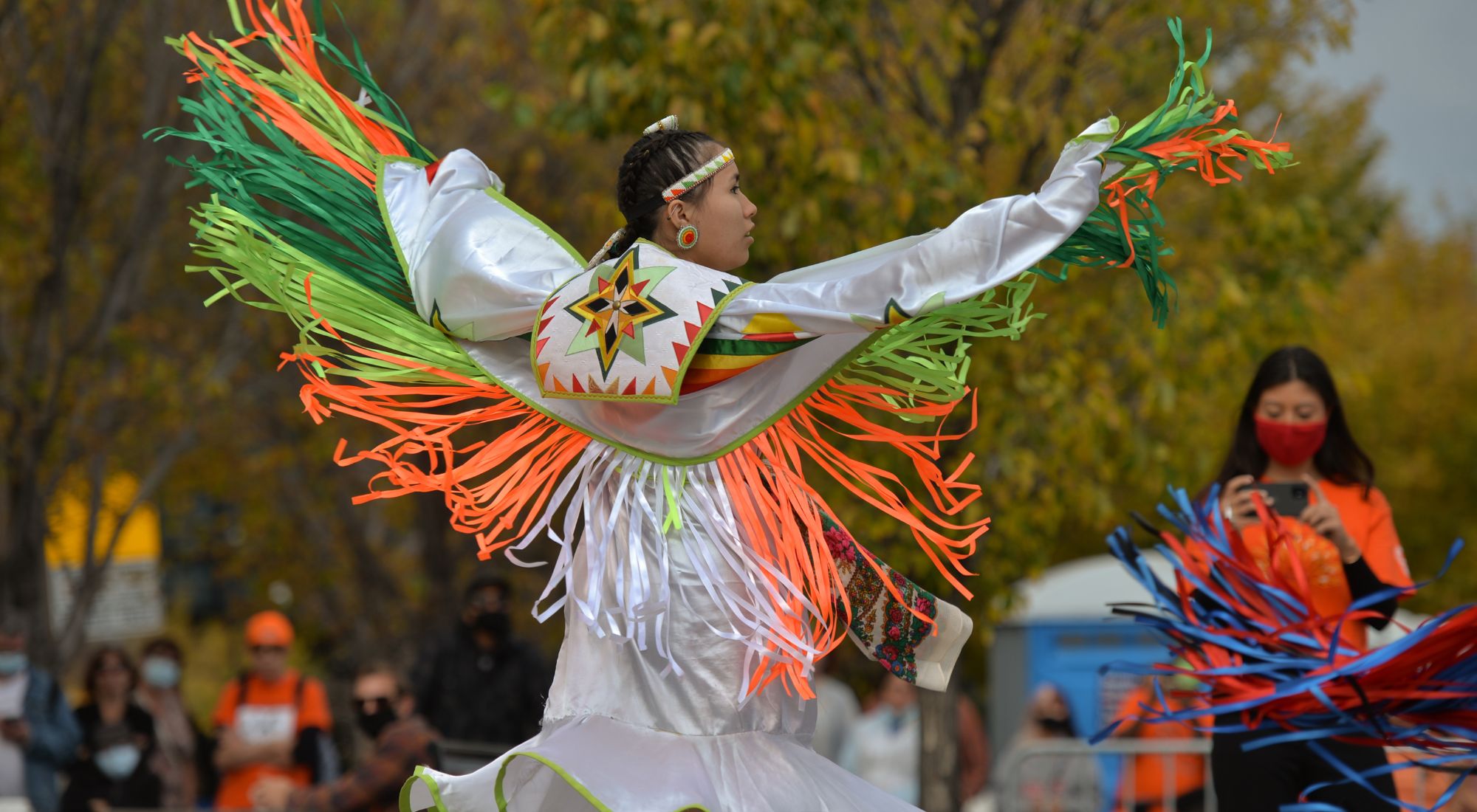
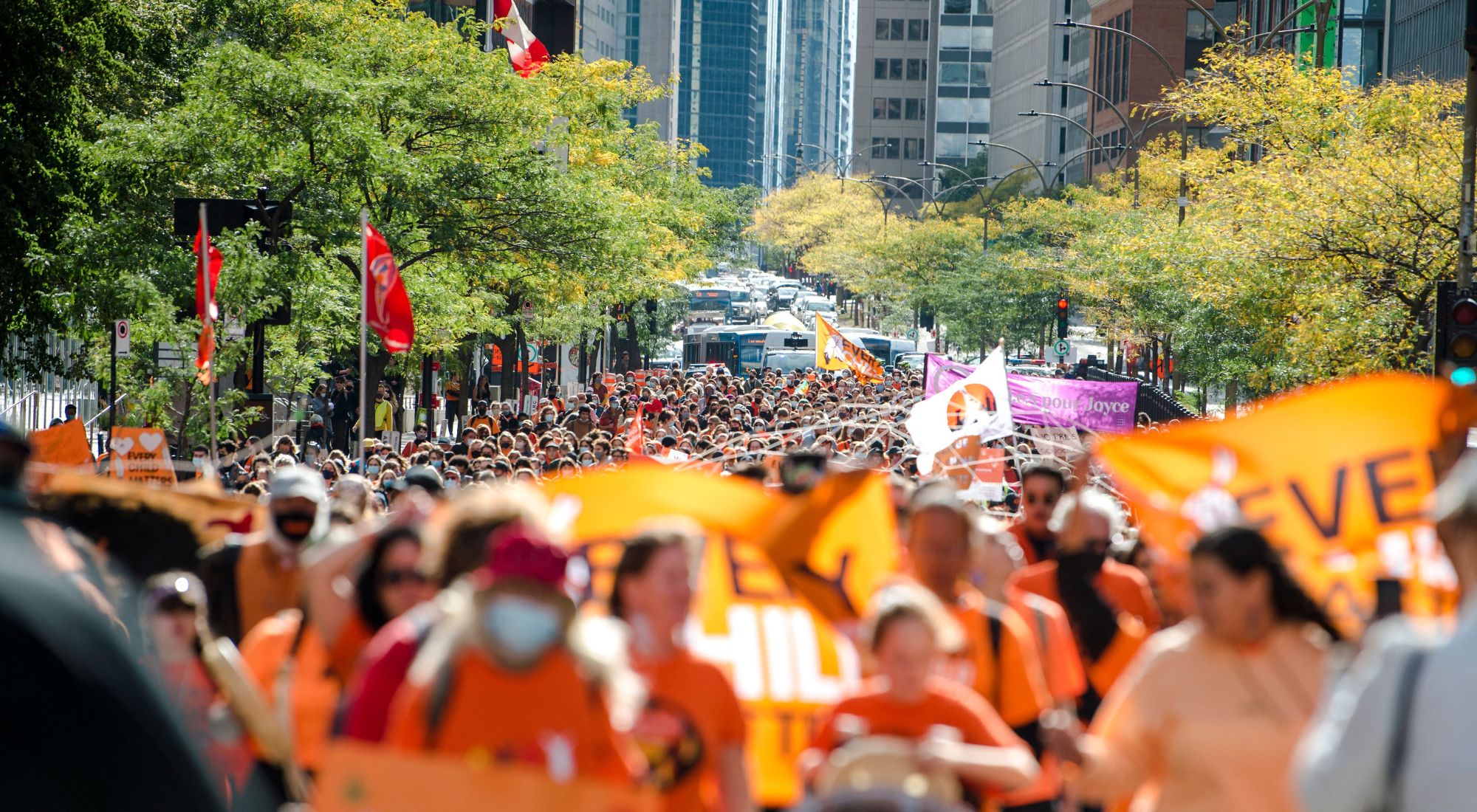
NATIONAL DAY FOR TRUTH & RECONCILIATION EVENTS
- VIRTUALLY – The National Centre for Truth and Reconciliation has been hosting a series of virtual events this week. You can view the schedule and learn more about the events here.
- TORONTO, ONTARIO – The Native Child and Family Services of Toronto ’s 26th Annual Community Pow Wow will take place on Saturday, September 30 in Dufferin Grove Park (875 Dufferin St.). Grand Entry: 12 p.m.
- OTTAWA, ONTARIO – The National Centre for Truth and Reconciliation will host Remembering the Children at 1 p.m. on Saturday, September 30 on Parliament Hill. The 90-minute memorial gathering will welcome residential school survivors, Indigenous leaders and dignitaries.
- GATINEAU, QUEBEC – On October 4th, attend one of hundreds of in-person or virtual Sisters in Spirit vigils across the country. Every year, we gather to honour Indigenous women, girls, and two-spirit people who have gone missing or been murdered. The Native Women’s Association of Canada Vigil begins at 5:45 pm at NWAC’s Social, Cultural and Economic Innovation Center at 120 Promenade du Portage, Gatineau, QC.
- VANCOUVER, BRITISH COLUMBIA – The Nisga’a Ts’amiks Vancouver Society will honour the lost children and survivors from the residential school system with a National Day For Truth And Reconciliation event at John Hendry Park at Trout Lake Community Centre on September 30, from 1:00 p.m. to 4:00 p.m.
- QUESNEL, BRITISH COLUMBIA – The Quesnel Friendship Centre will host a Truth and Reconciliation Celebration from 10:00 a.m. to 3:00 p.m. on Saturday, September 30.
- DRUMHELLER, ALBERTA – On Saturday, September 30 at 11:00 a.m., a National Day for Truth and Reconciliation Ceremony will take place at New Downtown Plaza hosted by the Mamawi Tapwewin Fellowship. Learn more about the Indigenous history and culture from guest speakers, watch performers, prayer, smudging and enjoy a feast.
- HALIFAX, NOVA SCOTIA – Enjoy interactive cultural demonstrations and refreshments at the Mi’kmaw Native Friendship Centre on Saturday, September 30 from 11:00 a.m. – 2:00 p.m.
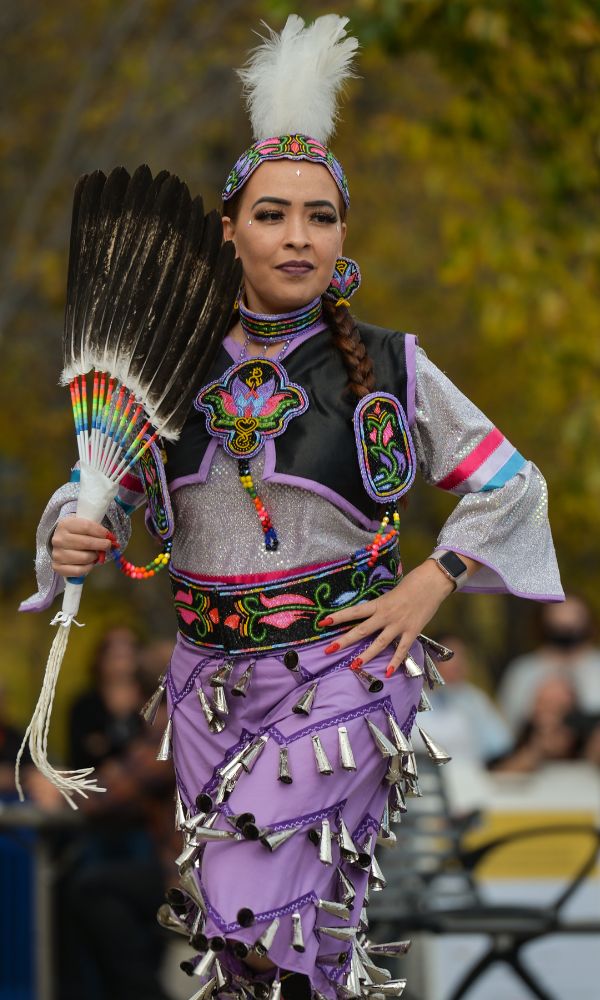
Michellaine Sleigh, USAY’s Ambassador, during a jingle dress performance as the City of Calgary commemorates Orange Shirt Day, and observes the first National Day for Truth and Reconciliation on September 30, 2021, with an outdoor official ceremony at Fort Calgary. (Photo by Artur Widak/NurPhoto via Getty Images)
A student takes part in a smudging ceremony of a commemoration during the National Day for Truth and Reconciliation in Toronto, Canada, on Sept. 30, 2022. (Photo by Zou Zheng/Xinhua via Getty Images)
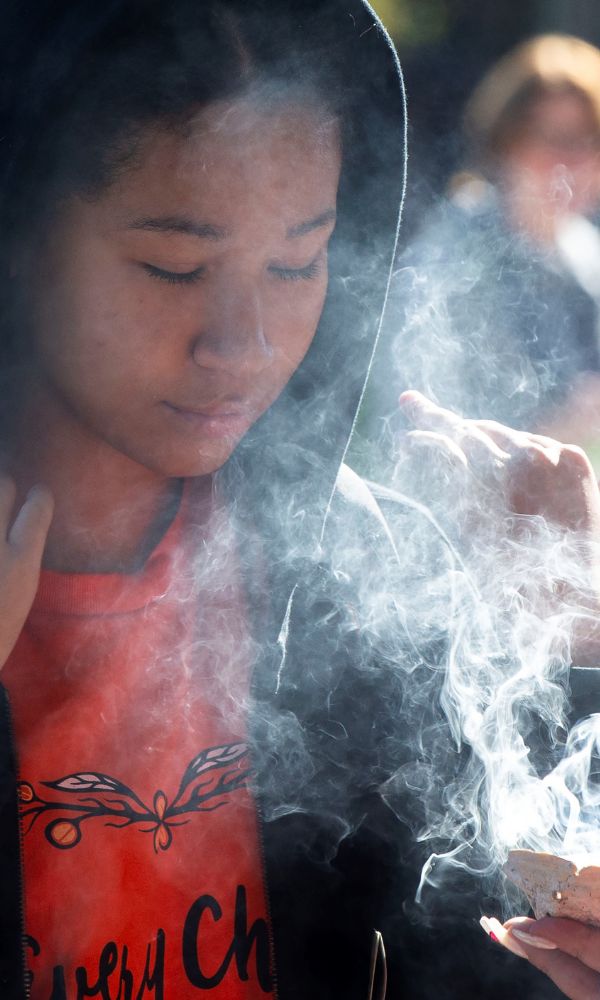
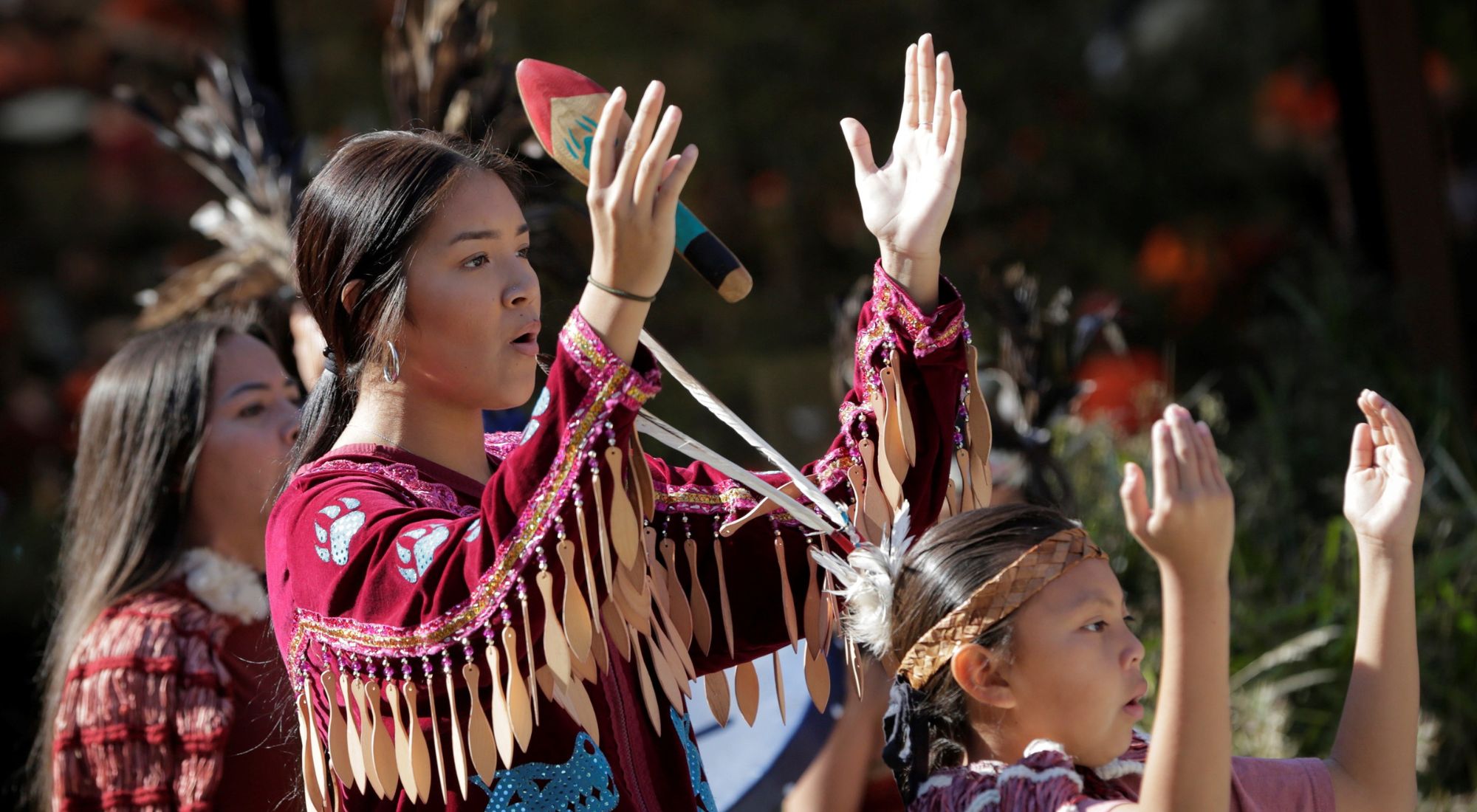
SHARE WITH YOUR COMMUNITIES
- Talk to your non-Indigenous friends and family members, including children, about the residential school system and the ongoing harms. Please be mindful that people are grieving and many are reliving their pain and trauma.
- Share posts on social media from Indigenous-led organisations.
CONTACT YOUR ELECTED REPRESENTATIVES
Call on your elected representatives at all levels of government to act for justice and accountability by asking the federal government to:
- Implement the 94 calls to action from the Truth and Reconciliation Commission;
- Implement the 213 calls for justice from the National Inquiry into Missing and Murdered Indigenous Women and Girls;
- Implement the calls in the First Nations Child and Family Caring Society of Canada’s Spirit Bear Plan;
- Fully cooperate with international investigations into human rights abuses experienced by Indigenous peoples in Canada;
- Implement UN recommendations to halt resource development projects that do not have the free, prior, and informed consent of affected communities;
- Fully fund mental health and other services to support Indigenous peoples in dealing with traumas caused by colonial policies and practices, in accordance with their wishes;
- Where requested by affected communities, fully fund examinations of burial grounds at other former residential and day schools and ensure that Indigenous peoples control access to sites according to their own laws and customs;
- Investigate and prosecute perpetrators responsible for the deaths of Indigenous children at residential schools;
- Appoint a special rapporteur and create a legal framework to protect burial sites; and
- Urge the Catholic Church to release all records and photos related to residential schools, and again seek an apology and reparations for survivors and their families.
DONATE TO INDIGENOUS ORGANISATIONS & INITIATIVES
Donate directly to Indigenous-led organizations that are supporting residential school survivors and their families along with language revitalization, cultural and land-based initiatives. Find a grassroots organization in your community to donate to or consider donating to the following:
- The Indian Residential School Survivors Society
- The KUU-US Crisis Line Society
- First Nations Child and Family Caring Society
RECOMMENDED READING
(Courtesy of the Amnesty International Book Club)
- Suffer the Little Children by Tamara Starblanket
- Indian Horse by Richard Wagamese
- The Inconvenient Indian by Thomas King
- Monkey Beach by Eden Robinson
- Medicine Walk by Richard Maramese
- Seven Fallen Feathers by Tanya Talaga
- The Break by Katherena Vermette
- The Right to Be Cold by Sheila Watt-Cloutier
- The Marrow Thieves by Cherie Dimaline
- Moon of the Crusted Snow by Waubgeshig Rice
- A Mind Spread Out on the Ground by Alicia Elliott
- Crow Winter by Karen McBride
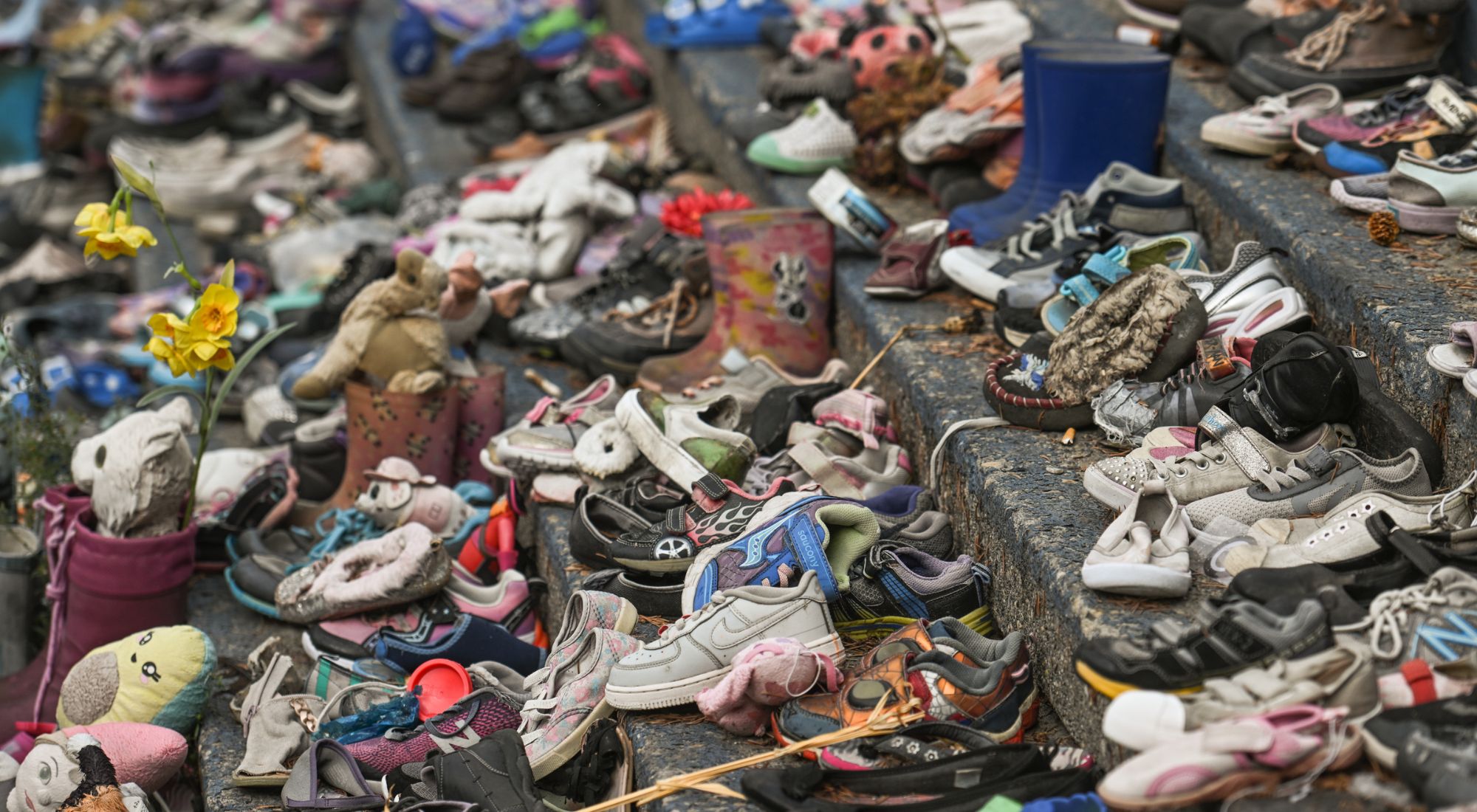
LEARN MORE ABOUT THE RESIDENTIAL SCHOOL SYSTEM
- Read the full report of the Truth and Reconciliation Commission and in particular the 94 calls to action
- Read the full report of the National Inquiry into Missing and Murdered Indigenous Women and Girls and in particular the 231 Calls for Justice
- Use Truth and Reconciliation: My Action Plan from the late Sarah Robinson to support your learning and action
- Read the Spirit Bear Plan from the First Nations Child and Family Caring Society
- Stolen Sisters: A Human Rights Response to Discrimination and Violence against Indigenous Women in Canada (report here) or the summary report
- No More Stolen Sisters: The Need for a Comprehensive Response to Discrimination and Violence Against Indigenous Women in Canada
- Out of Sight, Out of Mind: Gender, Indigenous Rights, and Energy Development in Northeast British Columbia, Canada
- Métis Perspectives of Missing and Murdered Indigenous Women, Girls and LGBTQ2S+ People here (Les Femmes Michif Otipemisiwak)
- Addressing Gendered Violence against Inuit Women: A review of police practices in Inuit Nunangat (Pauktuutit)
- Strategic Plan for Inuit Violence Prevention and Healing (Pauktuutit)
- Red Women Rising: Indigenous Women Survivors in Vancouver’s Downtown Eastside (Downtown Eastside Women’s Centre)
- Missing and Murdered Indigenous Women and Girls in Tiohtiá:ke/Montreal: Towards a Meaningful Collaboration between the SPVM and Indigenous Communities (Quebec Native Women)
- Read the blog: Made of Sterner Stuff—The Problem with Allies (First Peoples Law)
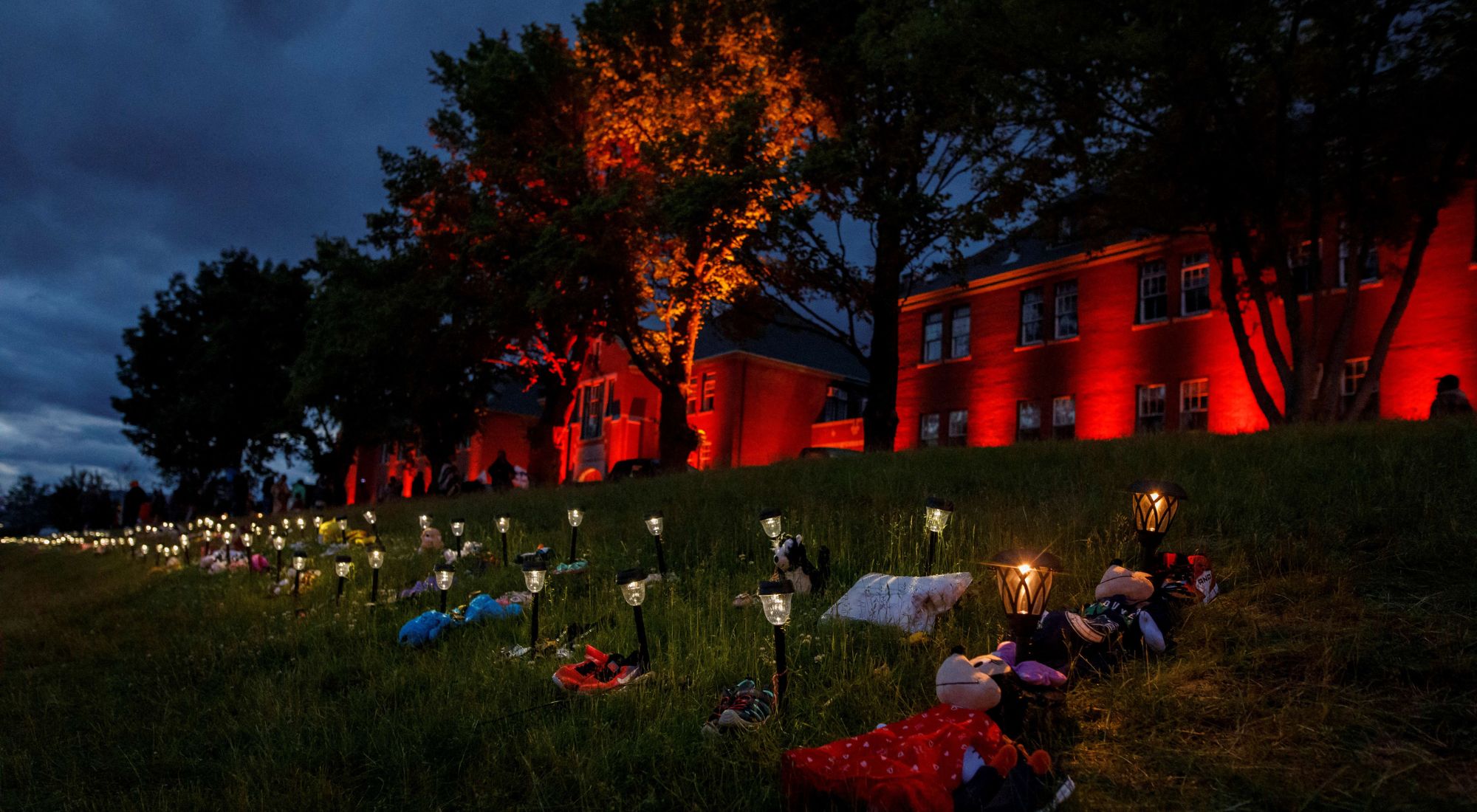
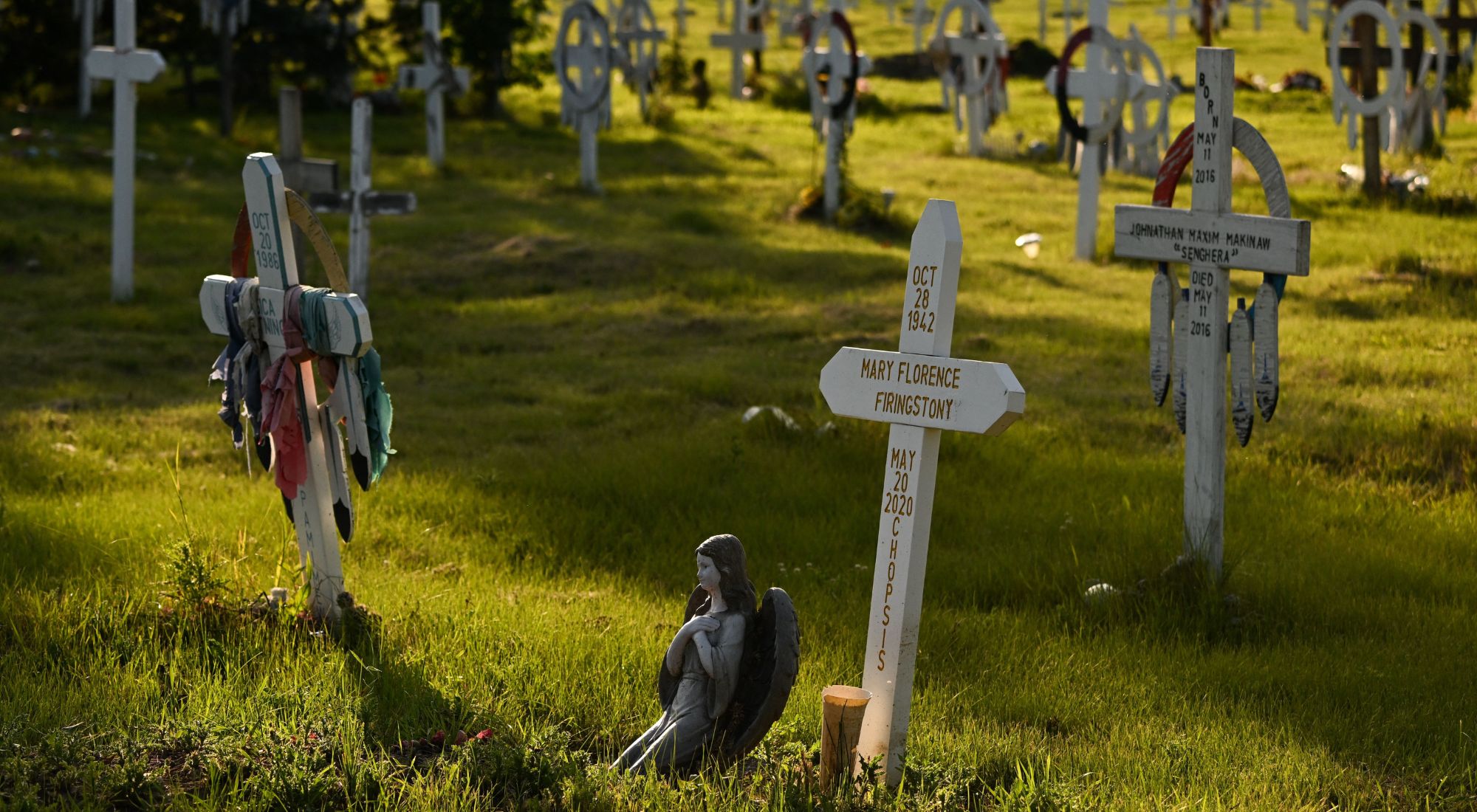
IF YOU NEED SUPPORT
The Indian Residential Schools Survivors Society is available for survivors and those affected at 1-800-721-0066 or on the 24 hour crisis line at 1-866-925-4419. British Columbia has a First Nations and Indigenous Crisis Line offered through the KUU-US Crisis Line Society at 1-800-588-9717.
- Crisis Services Canada 1-833-456-4566 or text 45645
- Hope For Wellness Helpline for Indigenous Peoples, 1-855-242-3310
- Native Youth Crisis Line 1-877-209-1266
- National Indian Residential School Crisis Line 24-hour crisis line, 1-866-925-4419












